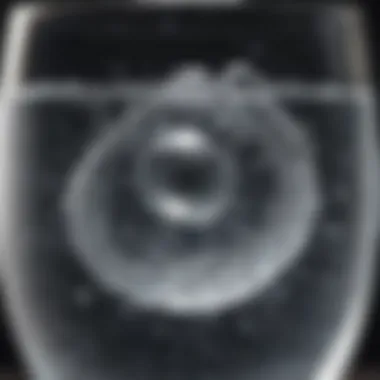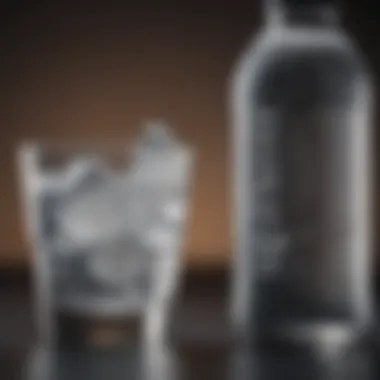The Effects of Seltzer Water on Digestive Gas


Intro
Seltzer water has gained popularity as a refreshing alternative to sugary drinks. While many enjoy its fizz and flavor, there is a growing interest in understanding its effects on digestive health, particularly regarding gas production. This article seeks to bridge the gap between enjoyment of seltzer and potential impacts on the digestive system. We will explore the composition of seltzer, the influence of carbonation on digestion, and how individual dietary factors contribute to gas formation. Understanding these elements is vital for making informed choices about incorporating seltzer into a daily diet.
Health Benefits
Physical Health Benefits
Seltzer water offers several potential benefits that contribute positively to overall physical health. It is calorie-free and hydrating, making it an excellent alternative for those trying to reduce energy intake while maintaining hydration. Regular consumption of seltzer can help satisfy cravings for carbonated beverages without the added sugars and calories found in sodas.
Additionally, seltzer can enhance digestion. The carbonation may stimulate gastric secretions, potentially aiding the digestive process for some individuals. However, the effect can vary widely among people; thus, seltzer might not have the same impact on everyone.
Mental Health Benefits
While the physical aspects are often emphasized, the mental health benefits should not be overlooked. Drinking seltzer can be a simple pleasure and offers a sensory experience that may elevate mood. For individuals who are mindful of their hydration habits, the lively sensation of bubbles can make drinking water feel less monotonous. This can encourage more frequent fluid intake, thereby supporting mental clarity and overall wellness.
"Seltzer water can provide both physical pleasure and support mental well-being, especially for those looking to maintain a balanced lifestyle."
Practical Tips
Choosing the Right Seltzer
When selecting seltzer for consumption, consider these factors:
- Ingredient Label: Look for products that contain carbonated water and natural flavors without added sugars or preservatives.
- Sodium Content: Some seltzers may have high sodium levels, which could impact individuals with hypertension. Opting for low-sodium options may be wise.
- Flavor Varieties: Experiment with different flavors to find what suits your palate, but ensure they are naturally flavored with no artificial additives.
Managing Digestive Gas
To minimize digestive discomfort related to gas, consider the following guidelines:
- Moderate Consumption: Start with small amounts of seltzer to gauge how your body reacts. Increase gradually if tolerated well.
- Pairing Foods: Be mindful of food combinations when consuming seltzer. Pairing it with heavy or rich meals might increase the likelihood of gas.
- Avoid Straws: Drinking directly from a can or bottle may help reduce air swallowing, which can contribute to gas formation.
Lifestyle Integration
Incorporating seltzer into a health-conscious lifestyle can be simple:
- Add It to Meals: Pair seltzer with meals instead of sugary drinks.
- Stay Active: Physical activity can aid digestion. Incorporating a regular fitness routine may help manage digestive discomfort, allowing seltzer to be enjoyed with less impact on gas.
In summary, understanding the effects of seltzer water on digestive gas is essential for those looking to integrate it into their dietary habits consciously. By considering both the benefits and potential drawbacks, individuals can make informed decisions that suit their health needs.
Understanding Seltzer Water
Seltzer water has gained popularity as a refreshing beverage choice. However, its effects on digestion, particularly concerning gas production, merit careful examination. Understanding seltzer water provides insights into how carbonation and its components may influence digestive health. This section explores the definition, composition, and varieties of seltzer water, offering clarity on its potential impact on gastric processes.
Definition and Composition
Seltzer water is a type of carbonated water that is produced by infusing regular water with carbon dioxide gas under pressure. This process creates bubbles, giving seltzer its effervescence. The primary component of seltzer water is O, making it fundamentally similar to still water. However, the carbonation process alters its physical properties and interactions within the digestive system.
In addition to carbon dioxide, some brands may incorporate minerals to enhance flavor, distinguishing them from plain seltzer. Common minerals include sodium, potassium, and magnesium, although their presence varies significantly across different brands.
Types of Seltzer Water
There are several types of seltzer water available in the market today. These can generally be categorized as follows:
- Plain Seltzer: This is simply carbonated water without any added flavors or sugars. It serves as a great alternative to soda for hydration without added calories.
- Flavored Seltzer: Many brands offer seltzer with natural fruit flavors. Generally, they do not contain sugars or artificial sweeteners, but some may have minimal calories.
- Sparkling Mineral Water: This type is sourced from mineral springs and contains natural minerals and carbonation. It can provide additional health benefits due to its mineral content.
- Tonic Water: Often confused with seltzer, tonic water contains added sugars and quinine, making it a different product altogether.
Understanding these distinctions is crucial, particularly for those who monitor their dietary intake. Each type of seltzer can have different effects on digestion and gas production depending on its ingredients.
The Science of Carbonation
Understanding carbonation is crucial in comprehending how seltzer water may affect digestive gas. Carbonation refers to the presence of dissolved carbon dioxide gas under pressure, which creates the characteristic bubbles in carbonated beverages. This physical process not only alters the sensory experience of drinking seltzer but also has implications on digestive health.
When you open a bottle or can of seltzer, the pressure is released, allowing carbon dioxide to escape, creating fizz. This process can facilitate a refreshing drinking experience, as many consumers enjoy the sensation of carbonation. However, the interaction between carbonation and our digestive system merits further investigation.


How Carbonation Works
The mechanism of carbonation is straightforward yet fascinating. Carbon dioxide gas is dissolved in water under high pressure. Once released from the container, the gas forms bubbles as it attempts to return to its gaseous state. As we drink seltzer water, these bubbles travel through the esophagus and into the stomach.
The presence of carbon dioxide can stimulate stomach lining and trigger the release of gastric juices. Some research suggests that small amounts of carbonation might enhance digestion due to this increased gastric activity. However, if consumed excessively, the rapid influx of gas may lead to discomfort, including bloating and burping.
Moreover, the sensation of fullness can occur more rapidly with carbonated drinks, which may discourage further consumption of food. This aspect is frequently examined by health professionals focusing on weight management and satiety.
Carbonation and Digestion
The relationship between carbonation and digestion is complex. Carbonated beverages can influence gastrointestinal motility, which is how quickly food moves through the digestive tract. Some studies indicate that carbonated drinks may accelerate this process under specific conditions, aiding digestion for certain individuals. Conversely, others might experience delayed digestion or increased gas formation, leading to discomfort.
The body's response to carbonation is subjective and varies by individual. For some, the introduction of carbon dioxide may lead to excessive flatulence and a feeling of bloating. Others might find that seltzer water helps stimulate digestion without significant adverse effects. Factors like existing gastrointestinal conditions, overall diet, and personal tolerance to carbonation can all play roles in how individuals react.
Understanding these nuances is vital, especially for health professionals advising clients about seltzer water consumption. The implications can range from providing hydration benefits to managing potential digestive discomfort.
Exploring the balance between enjoyment and the body's response to carbonation is essential for making informed dietary choices.
Ultimately, while carbonation can introduce a level of complexity to digestion, the effects may differ from one person to another. This underscores the importance of personalized nutrition and a careful approach to incorporating carbonated beverages into one's diet.
Seltzer Water and Gas Production
The discussion of seltzer water and its relationship with digestive gas is crucial in understanding how this popular beverage might affect our bodies. Seltzer water is often seen as a refreshing alternative to sugary sodas or plain water, but its carbonation can impact digestion in notable ways. Understanding this connection can help individuals make informed choices about their dietary habits and the consumption of carbonated beverages.
Possible Mechanisms Leading to Gas
Several mechanisms can contribute to gas production when consuming seltzer water. The carbonation process introduces carbon dioxide into the liquid, which, when ingested, can lead to increased pressure in the digestive system. This pressure may cause discomfort and a sensation of fullness. As the gas is released in the gut, it may combine with other digestive gases naturally produced during the breakdown of food.
- Gas Formation: Carbon dioxide in seltzer is a major factor. When it reaches the stomach, it mixes with stomach acids and can lead to the production of additional gas.
- Bloating: The sensation of bloating often accompanies excessive gas production. This can be due to the release of carbon dioxide itself or a response from the digestive tract to pressure change.
- Food Interaction: Consuming seltzer water alongside certain foods—especially those high in fiber or fermentable carbohydrates—can accentuate gas production. The interaction between seltzer and these foods may enhance the microbial fermentation process in the gut, leading to increased gas.
Individuals reacting differently to seltzer water can vary, but these mechanisms provide a foundational understanding of why seltzer might contribute to digestive gas.
Individual Variations in Response
Individual responses to seltzer water consumption vary widely. Factors such as genetics, diet, and existing digestive health play significant roles in determining how one’s body reacts to carbonation.
- Intolerance Levels: Some people may be more sensitive to carbonated beverages. Symptoms can manifest as bloating, flatulence, or even abdominal pain.
- Dietary Habits: An individual’s overall diet influences gas production. For example, a diet rich in fiber may react differently with seltzer compared to a low-fiber diet. Dietary patterns can dictate the volume of gas produced during digestion.
- Health Conditions: Those with conditions like irritable bowel syndrome (IBS) or gastroesophageal reflux disease (GERD) may experience heightened sensitivity. The gas buildup from seltzer water can exacerbate existing symptoms, making it crucial for these individuals to monitor their intake.
Investigating Common Beliefs
In understanding the effects of seltzer water on digestive gas, it is crucial to delve into prevalent beliefs surrounding this popular beverage. Insights into what people believe about seltzer can reveal common misconceptions and highlight the need for evidence-based information. These beliefs can influence consumption habits and, ultimately, digestive health.
Dispelling Myths about Seltzer
Numerous myths persist about seltzer water, particularly regarding its effects on digestion. One prevalent myth suggests that seltzer water causes more gas than still water. However, research indicates that while carbonation may lead to temporary gas, it does not necessarily result in long-term digestive issues for everyone. This is because individual reactions vary based on factors such as the pre-existing gut flora and overall dietary habits.
Another common belief is that all carbonated drinks are equally harmful. In reality, seltzer water typically contains no added sugars or artificial sweeteners, making it a healthier alternative compared to sugary soft drinks or fruit-flavored beverages. Seltzer can hydrate, without exposing individuals to excessive calories or unwanted ingredients.
"Understanding the specific impact of seltzer requires examining personal dietary contexts and not relying solely on generalizations."
Furthermore, some individuals believe that seltzer might increase acid production in the stomach, leading to digestive discomfort. While carbonation does increase carbon dioxide levels in the stomach, it does not inherently heighten acidity. In fact, mild carbonation may stimulate digestion for some, easing the process rather than complicating it.
Cultural Perspectives on Carbonated Beverages
The fascination with carbonation spans cultures and societies. For many, carbonated drinks are staples in social gatherings, meals, and celebrations. Different cultures embrace unique forms of carbonation, from Italian seltzer to American tonic water. These cultural differences shape perceptions of seltzer water’s effects on health.
In some regions, seltzer is viewed as a digestive aid, believed to help alleviate fullness after meals. In contrast, others may assert that carbonated beverages should be consumed sparingly due to potential health concerns. The cultural context can create varying expectations around the consumption of seltzer. It is essential to recognize how these beliefs may influence individual practices and attitudes toward digestion.
By examining these cultural interpretations, we gain a more nuanced understanding of how seltzer water fits into the broader dietary landscape. This exploration also encourages individuals to approach seltzer consumption based on scientific data rather than anecdotal beliefs. An informed perspective fosters healthier habits that can benefit overall digestive health.
Dietary Factors Influencing Gas Production
Understanding how diet interacts with seltzer water is essential in exploring its effects on digestive gas. The food we consume can significantly alter the amount of gas our bodies produce. This section delves into two main aspects: the role of dietary fiber and the influence of food combinations. Each plays a critical role in how seltzer water might contribute to or mitigate digestive discomfort.


Role of Dietary Fiber
Dietary fiber is a crucial component of a healthy diet. It comes in two forms: soluble and insoluble. Soluble fiber dissolves in water and can help manage blood sugar levels and lower cholesterol, while insoluble fiber adds bulk to stool, promoting regularity.
In relation to gas production, fiber is particularly notable. As fiber ferments in the gut, it produces gas as a byproduct. This can be exasperated when fiber-rich foods are consumed with seltzer water. Foods high in fiber include beans, lentils, fruits, and whole grains. These foods, when combined with the carbonation of seltzer, can lead to increased gas production. It is beneficial to monitor how much dietary fiber is consumed, especially if seltzer is frequently included in one's meals.
"While fiber is essential for digestive health, a sudden increase in fiber intake can lead to discomfort and excessive gas production."
Balancing fiber intake is critical. Introducing fiber gradually can aid in acclimating the digestive system, potentially reducing the gas output associated with seltzer consumption. Additionally, pairing fiber-rich foods with seltzer can also influence how the gas is experienced, as certain combinations may have a greater impact on digestion than others.
Influence of Food Combinations
The interaction between seltzer water and other foods creates a unique environment in the digestive system. The combinations we choose can either minimize or increase digestive gas. Certain foods, when paired with carbonated beverages, can bring forth varying effects. For example, pairing seltzer with high-sugar or high-fat foods could lead to increased fermentation and, consequently, more gas.
Common pairings that may provoke gas include:
- Beans and legumes: They are known for producing gas already; when accompanied by seltzer, the effect may amplify.
- Cruciferous vegetables: Foods like broccoli and cabbage can create gas on their own, which might be exacerbated when combined with carbonation.
- Dairy products: For those lactose intolerant, mixing seltzer with dairy can lead to significant discomfort and gas.
Conversely, certain combinations might be more gentle on the digestive system. For instance, lighter meals or simple carbohydrates paired with seltzer could minimize disagreement. It pays to pay attention to how these combinations affect you, as individual responses will vary.
Epilogue
Dietary factors are fundamental when considering the effects of seltzer water on digestive gas. Understanding the role of dietary fiber and the influence of food combinations can help individuals make informed decisions about their consumption habits, ultimately guiding them towards a better digestive experience.
Practical Recommendations for Consumption
Understanding how to consume seltzer water effectively can greatly enhance its benefits and potentially reduce any negative impacts on digestive gas. This section aims to guide readers on the most effective ways to incorporate seltzer into their daily routines. By considering the optimal serving sizes and the timing of consumption, individuals can enjoy their beverages without undue side effects.
Optimal Serving Sizes
When it comes to seltzer water, serving size matters. Consuming too much can lead to an increase in gas production within the digestive system. It’s essential to find a balance.
- General Recommendations: A standard serving of seltzer is generally around 8 to 12 ounces. For most adults, this amount allows for enjoyment without overwhelming the stomach.
- Individual Factors to Consider: Each person’s tolerance level can vary based on multiple factors such as body weight, metabolism, and overall digestive health. Start with smaller amounts, such as 8 ounces, and gradually increase as needed. Monitoring one’s own response is crucial.
- Frequency of Consumption: Limiting seltzer to two to three times a day may help prevent excessive gas. Spacing out servings can also allow your body to adjust comfortably.
Timing of Consumption
The timing of when to drink seltzer can also significantly impact its effect on digestive gas. Certain times may be more favorable than others.
- Pre-Meal Drinking: Having a small serving of seltzer 30 minutes before meals may assist with appetite regulation. This can be beneficial for those looking to manage weight or reduce overeating.
- Post-Meal Considerations: Conversely, consuming seltzer immediately after eating may increase the likelihood of gas. If one chooses to drink after meals, it is better to wait at least an hour to allow for some digestion.
- Activity-Related Timing: For workouts or post-exercise hydration, seltzer can be a refreshing option. However, it may be wise to avoid it right before exercising as carbonation can create discomfort during vigorous activities.
"Each individual’s body is unique, and adjusting serving sizes and timing can significantly enhance the enjoyment of seltzer and minimize digestive issues."
By paying careful attention to these practical recommendations, individuals can enjoy seltzer water while mitigating the chances of unwanted digestive gas. Balancing serving sizes and consumption timing provides a foundation for integrating seltzer into a health-conscious lifestyle.
Alternative Beverage Options
In the pursuit of digestive wellness, seltzer water is often highlighted for its effervescence and refreshing qualities. However, understanding alternative beverage options is essential for those monitoring their digestive health and gas production. This section explores notable alternatives to seltzer, focusing on specific elements like ingredients, health benefits, and potential drawbacks of these options.
Comparative Analysis with Other Carbonated Drinks
When comparing seltzer water with other carbonated drinks, it is critical to consider the diversity in ingredients and their effects on digestion. Regular soft drinks, for example, typically contain high amounts of sugar and caffeine. These additives can lead to increased gas production and bloating. In contrast, products like club soda or tonic water may contain sodium or quinine, potentially influencing gastrointestinal comfort differently.
A few crucial differences include:
- Sugar Content: Seltzer water generally contains zero sugars, while sodas can have excessive sugar levels, leading to digestive issues.
- Artificial Ingredients: Many carbonated beverages have artificial flavors or sweeteners that can irritate the digestive tract.
- Acidity Levels: The pH level of carbonated drinks varies and can affect stomach acid balance. Higher acidity may lead to more significant digestive discomfort for some individuals.
Through this comparative lens, seltzer water emerges as a more benign choice for maintaining digestive tranquility while still enjoying a fizzy experience.
Healthier Hydration Alternatives
Beyond carbonation, a variety of hydration options can support digestive health while reducing gas. For instance, herbal teas such as chamomile or peppermint are known to soothe the digestive system. These options offer warm, comforting benefits without the added carbonation that could potentially increase gas levels.
Other alternatives worth noting include:


- Infused Water: Combining water with fruits or herbs for flavor without carbonation.
- Coconut Water: This natural beverage hydrates while providing electrolytes, often without causing gas.
- Bone Broth: A nutrient-dense option that is easy on digestion and nurtures gut health.
"Choosing the right hydration options can be as crucial for digestive health as the food we consume."
Opting for these alternatives not only diversifies one's hydration routine but may minimize gas production while promoting overall digestive well-being.
By understanding and selecting from these beverage options, individuals can still enjoy a satisfying drink while actively attending to their digestive health.
Seltzer Water in Health and Wellness Context
Seltzer water has gained popularity in recent years, especially among health-conscious individuals. It is essential to understand its possible impact within the health and wellness context. This section will examine two critical areas: how seltzer may assist with weight management and the benefits it can provide for hydration.
Seltzer and Weight Management
The relationship between seltzer water and weight management is of particular interest. Many people choose seltzer over sugary soft drinks. This choice can lead to reduced calorie intake. Seltzer contains carbonated water, often with no calories, sugars, or artificial additives. As a result, it may be a valuable tool for those aiming to control their weight.
Some studies suggest that drinking carbonated water might enhance satiety. Individuals may feel fuller after consuming seltzer, possibly leading to lower overall food intake. Thus, for dieters, substituting seltzer for other higher-calorie beverages is a practical strategy. However, this effect may vary based on individual responses and dietary habits.
Several considerations come to mind when discussing seltzer and weight management:
- Caloric Content: Choosing plain seltzer over sweetened options is crucial.
- Flavorings: Some flavored seltzers may have added sugars or calories, which can counteract weight loss efforts.
- Personal Preference: Enjoying the beverage is essential in maintaining any dietary change.
Hydration Benefits of Seltzer
Staying hydrated is vital for overall health. Seltzer water can contribute to daily fluid intake, promoting hydration. Many individuals find that sparkling water is more enjoyable than still water, thus encouraging them to drink more.
One key advantage of seltzer is its ability to provide hydration without added sugars or calories. This makes it a suitable alternative to soda or fruit juices, which can be high in sugar and calories. Maintaining proper hydration can support various bodily functions, including digestion and circulation.
"Proper hydration plays a key role in health and focusing on low-calorie, enjoyable beverages can help in achieving daily fluid goals."
Future Research Directions
Research on the effects of seltzer water on digestive gas is still developing. Understanding the long-term implications of carbonation on gut health is significant for both academic and practical applications. An emphasis on this area can foster better consumption practices and inform dietary recommendations. Potential benefits include identifying how seltzer can be integrated into various diets without negative repercussions, particularly for individuals sensitive to gas production.
Studies on Long-term Effects of Carbonation
Current literature lacks in-depth studies focused on the long-term effects of carbonated beverages like seltzer water. Initial findings suggest that the act of consuming carbonation might lead to temporary bloating or gas, but comprehensive research over extended periods is necessary to determine if these effects persist or alter with regular consumption.
Variables to consider in such studies might include:
- Types of carbonation methods
- Individual dietary patterns
- Participant demographics (age, gender, health conditions)
- Frequency and quantity of seltzer intake
Understanding these factors will allow for a more nuanced perspective on how seltzer fits into daily nutrition. It may lead to conclusive insights that guide health professionals in making informed recommendations for clients looking to maintain a healthy digestive system.
Exploring Alternative Carbonation Methods
Investigating alternative methods of carbonation offers another avenue for future research. Techniques like natural fermentation or utilizing specific carbon dioxide sources could present different digestive responses among consumers. Comparing these methods against traditional carbonation may highlight variations in how the body handles gas production.
Research could explore the following aspects:
- Health impacts: Are there differences in digestive comfort when consuming naturally carbonated beverages versus artificially carbonated ones?
- Flavor profile and consumer perception: How do taste and overall enjoyment play a role in beverage choice?
- Sustainability: What environmental impacts do different carbonation methods have?
In summary, diversifying research approaches around seltzer water and its effects may not only enhance our understanding but also guide future product development. Ultimately, the goal remains clear: to establish best practices for seltzer consumption, maximizing its enjoyment while minimizing potential discomfort.
Closure
The topic of seltzer water and its effects on digestive gas is particularly relevant in today's health-conscious society. As more individuals incorporate seltzer into their daily routines, understanding how it influences digestion becomes vital. By analyzing various factors, we obtain a clearer picture of the implications for those consuming these beverages.
Summarizing Key Findings
Several key points emerge from this exploration:
- Carbonation and Digestion: Carbonation in seltzer water may lead to gas production, though individual reactions can vary significantly.
- Dietary Influences: The impact of seltzer on digestive gas can be exacerbated by dietary fiber and specific food combinations. Those consuming high-fiber diets or certain food pairings should be particularly cautious.
- Myths and Realities: Common misconceptions about seltzer, such as its role in weight gain or intestinal distress, are often unfounded. Clarifying these myths provides a more accurate understanding of its place in a health-focused diet.
Overall, it is essential for individuals to consider their unique responses and dietary habits when consuming seltzer. Furthermore, practical recommendations regarding serving sizes and timing can aid in minimizing any discomfort from gas.
Final Thoughts on Seltzer Water and Gas
Seltzer water holds both potential benefits and challenges when it comes to digestive health. For health professionals, wellness coaches, and others in nutrition, this topic underscores the importance of personalized dietary advice. Each person may experience different outcomes based on their overall health, digestive function, and dietary composition. As research continues to emerge, future studies should shed more light on the long-term effects of carbonation on digestion. Understanding these dynamics will allow consumers to make informed choices that align with their wellness goals.
Overall, integrating seltzer water into a diet can be harmless for many, provided awareness is maintained regarding one's unique digestive needs.















